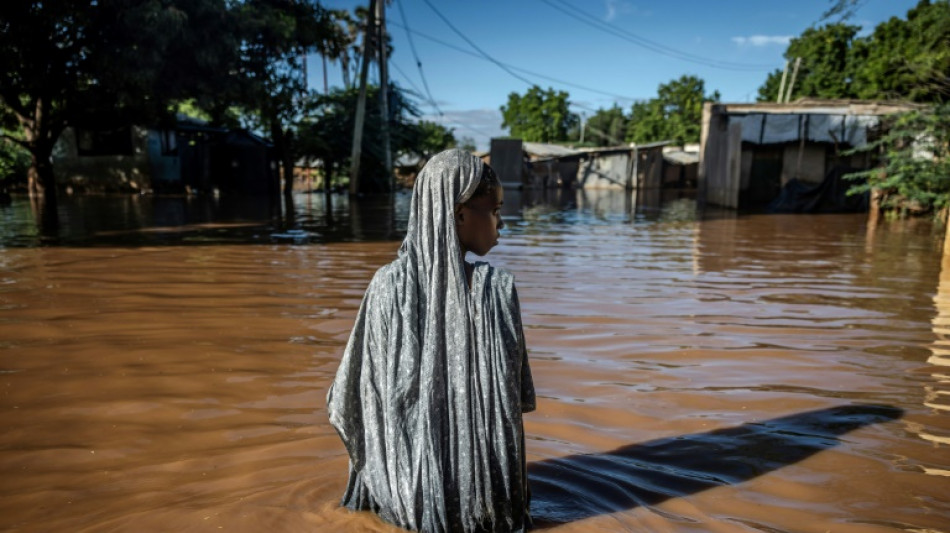
-
 Jaiswal slams majestic 161 but Australia fight back in Perth
Jaiswal slams majestic 161 but Australia fight back in Perth
-
Edinburgh's alternative tour guides show 'more real' side of city

-
 IPL teams set to splash the cash at 'mega-auction' in Saudi Arabia
IPL teams set to splash the cash at 'mega-auction' in Saudi Arabia
-
Olympics in India a 'dream' facing many hurdles

-
 Wounded Bangladesh protesters receive robotic helping hand
Wounded Bangladesh protesters receive robotic helping hand
-
Majestic Jaiswal 141 not out as India pile pain on Australia

-
 Giannis, Lillard lead Bucks over Hornets as Spurs beat Warriors
Giannis, Lillard lead Bucks over Hornets as Spurs beat Warriors
-
Juan Mata agent slammed as 'cowardly' by angry A-League coach

-
 Marta inspires Orlando Pride to NWSL title
Marta inspires Orlando Pride to NWSL title
-
Palestinian pottery sees revival in war-ravaged Gaza

-
 Main points of the $300 billion climate deal
Main points of the $300 billion climate deal
-
Robertson wants policy change for overseas-based All Blacks

-
 Israel retreat helps rescuers heal from October 7 attack
Israel retreat helps rescuers heal from October 7 attack
-
Afghan women turn to entrepreneurship under Taliban

-
 Mounting economic costs of India's killer smog
Mounting economic costs of India's killer smog
-
At climate talks, painstaking diplomacy and then anger

-
 Uruguayans head to polls with left hoping for comeback
Uruguayans head to polls with left hoping for comeback
-
Trump's mass deportation plan could end up hurting economic growth

-
 Iran director in exile says 'bittersweet' to rep Germany at Oscars
Iran director in exile says 'bittersweet' to rep Germany at Oscars
-
US consumers to bargain hunt in annual 'Black Friday' spree

-
 Cheers, angst as US nuclear plant Three Mile Island to reopen
Cheers, angst as US nuclear plant Three Mile Island to reopen
-
Scientists seek miracle pill to stop methane cow burps

-
 Australia ditches plans to fine tech giants for misinformation
Australia ditches plans to fine tech giants for misinformation
-
Developing nations slam 'paltry' $300 bn climate deal

-
 Red Bulls win 'Hudson River derby' to reach conference final
Red Bulls win 'Hudson River derby' to reach conference final
-
Neuville wins world title after Tanak crashes at Rally Japan

-
 Neuville wins world rally title after Tanak crashes in Japan
Neuville wins world rally title after Tanak crashes in Japan
-
Colapinto cleared for Las Vegas GP despite heavy crash

-
 'Smiling One' Amorim vows he has ruthless streak Man Utd need
'Smiling One' Amorim vows he has ruthless streak Man Utd need
-
Marseille down Lens to stay in touch with Ligue 1 leaders, Lyon draw

-
 New Zealand beat 'proud' Italy in Cane's Test farewell
New Zealand beat 'proud' Italy in Cane's Test farewell
-
Barca collapse in Celta draw without Yamal, Simeone hits milestone

-
 Thailand's Jeeno equals Yin for lead at LPGA Tour Championship
Thailand's Jeeno equals Yin for lead at LPGA Tour Championship
-
New Zealand beat Italy in Cane's Test farewell

-
 Marseille down Lens to stay in touch with Ligue 1 leaders, Lyon held to draw
Marseille down Lens to stay in touch with Ligue 1 leaders, Lyon held to draw
-
Liga leaders Barca suffer late collapse in Celta draw

-
 Retegui fires Atalanta top of Serie A ahead of Inter
Retegui fires Atalanta top of Serie A ahead of Inter
-
Greaves hits maiden Test century as West Indies dominate Bangladesh

-
 Venezuela opposition calls for mass anti-Maduro protest on Dec. 1
Venezuela opposition calls for mass anti-Maduro protest on Dec. 1
-
'Fragile' Man City in uncharted territory, admits Guardiola

-
 Erasmus hails Springbok strength in depth after thrashing Wales
Erasmus hails Springbok strength in depth after thrashing Wales
-
Postecoglou calls for consistent Spurs after Man City rout

-
 'We've never lived this situation' admits Guardiola
'We've never lived this situation' admits Guardiola
-
Lebanon says more than 55 killed in Israeli strikes

-
 'We've never lived this situation' admits Guardiola as Man City lose five in a row
'We've never lived this situation' admits Guardiola as Man City lose five in a row
-
Under-fire Gatland 'motivated' to continue as Wales coach

-
 South Africa send Wales crashing to 87-year low in Test rout
South Africa send Wales crashing to 87-year low in Test rout
-
Spurs condemn Man City to fifth straight defeat as Arsenal win

-
 Defeated Leipzig lose more ground on Bayern, Frankfurt go second
Defeated Leipzig lose more ground on Bayern, Frankfurt go second
-
South Africa put Wales to the sword to wrap up season


COP29 fight looms over climate funds for developing world
The developing world needs trillions of dollars in climate aid, but who should pay for it? Wealthy nations? Big polluters? Countries that got rich burning fossil fuels? All of the above?
A fight over this question looms at crucial negotiations next month as China and other major emerging economies come under pressure to chip in for climate action in poorer countries.
It is hoped a new deal can be struck at the UN COP29 climate conference to greatly lift financial assistance to countries least able to reduce carbon emissions and adapt to global warming.
The present bill of $100 billion a year is footed by a list of countries that were the richest and most industrialised at the time the UN climate convention was written up in 1992.
These donors -- including the United States, the European Union, Canada, Japan and others -- agree more money is needed, and intend to keep paying "climate finance" where it is needed most.
But they want others to share the burden, specifically developing countries that have become more prosperous and polluting in the decades since the original donor list was drawn up.
China –- today the world's largest polluter and second-largest economy –- is the obvious target, but Singapore and oil-rich Gulf states like Saudi Arabia could also come under scrutiny.
It is "entirely fair to add new contributing parties, given the ongoing evolution of economic realities and capabilities", the United States wrote in an August submission to the UN Framework Convention on Climate Change (UNFCCC).
- 'Bad faith' -
Diplomats from other developed countries have echoed this, arguing that the contributor list is based on outdated notions of rich and poor, and anyone who can pay should pay.
Some have proposed revised criteria against which potential contributors might be judged, such as income levels, purchasing power or their emissions of planet-warming greenhouse gases.
Calls to widen the donor base are deeply unpopular and have sparked heated exchanges in the months before COP29, which is being hosted in oil-and-gas-rich Azerbaijan, itself classified as a developing country.
Donors have been accused of forcing the matter onto the negotiating table while refusing to engage on the central question of how much they intend to pay.
For some involved "this was the literal definition of negotiating in bad faith", said Iskander Erzini Vernoit from the Imal Initiative for Climate and Development, a think tank based in Morocco.
It has "taken up a lot of airtime, and a lot of oxygen", he told AFP.
"For the sake of all of the poorest, most vulnerable countries of the world, it's not fair to hold the whole thing hostage."
Developing countries are pushing for the strongest possible commitment at COP29 to ensure adequate funding for clean energy projects, defensive sea walls and other climate adaptation measures.
Negotiators are nowhere near landing a concrete figure, but some developing countries are calling for over $1 trillion annually.
In a UNFCCC submission in August, the EU warned "the collective goal can only be reached if parties with high GHG-emissions (greenhouse gas) and economic capabilities join the effort".
- Tough talk -
For developing countries, who pays is non-negotiable: the 2015 Paris climate agreement reaffirmed that developed countries disproportionately responsible for global warming to date pick up the tab.
In a joint statement in July, China, India, Brazil and South Africa strongly rejected "attempts by developed countries to dilute their climate finance legal obligations under international law".
Azerbaijan's chief negotiator Yalchin Rafiyev told AFP in September that the gap between the United States and China over the issue was "narrowing", with a "softening" of stances on both sides.
China, like some other developing countries, actually pays climate finance, it just does so on its own terms.
Between 2013 and 2022, China paid on average $4.5 billion a year to other developing countries, the World Resources Institute (WRI) wrote in a September paper.
This amounted to roughly six percent of what developed countries paid over the same period, said the US-based think tank. China is not required to report this to the UNFCCC, and it is not counted toward the collective target.
Analysts say any formal additions to the donor list at COP29 are very unlikely, though some countries may agree to voluntary contributions in support of the broader goal.
G.Schulte--BTB



